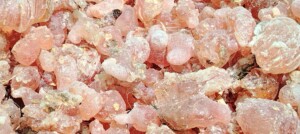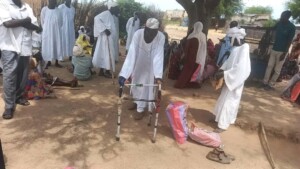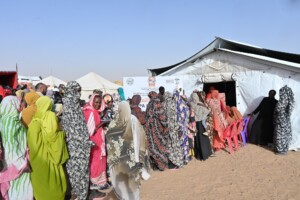Grand Ethiopian Renaissance Dam: Sudan rejects ‘unilateral actions’
Tensions are rising between Ethiopia, Egypt, and Sudan following the publication of satellite images that show the controversial Grand Ethiopian Renaissance Dam (GERD) on the Blue Nile filling with rainwater. However Ethiopia insists that the water that is to be seen from the satellite images has accumulated naturally during the rainy season, and denies that the dam’s sluice gates have been closed.
 Construction of the Grand Ethiopian Renaissance Dam (File photo: MoFA Ethiopia)
Construction of the Grand Ethiopian Renaissance Dam (File photo: MoFA Ethiopia)
Tensions are rising between Ethiopia, Egypt, and Sudan following the publication of satellite images that show the controversial Grand Ethiopian Renaissance Dam (GERD) on the Blue Nile filling with rainwater. However Ethiopia insists that the water that is to be seen from the satellite images has accumulated naturally during the rainy season, and denies that the dam’s sluice gates have been closed.
As reported by Radio Dabanga on Tuesday, the last round of negotiations between Sudan, Ethiopia, and Egypt on the GERD, which began on July 3 under the supervision of the African Union and South African President Cyril Ramaphosa, concluded without an agreement.
In reaction to the latest reports, underpinned by pictures of the swelling reservoir, captured in imagery on July 9 by the European Space Agency’s Sentinel-1 satellite, Sudan’s Ministry of Irrigation and Water Resources issued a press statement last night via the official Sudan News Agency (SUNA) reiterating its “firm rejection of any unilateral actions taken by any party”, especially at a time when the African Union and South African President Cyril Ramaphosa continues to seek an agreement between the three countries on the pending issues that could be resolved with robust political will.
The ministry says that water levels recorded at Deim station in the Blue Nile in Sudan of 90 million cubic metres released per day, suggest that the filling of the GERD has indeed started.
“The government of Sudan and the Ministry of Irrigation and Water Resources will follow these developments in a manner that secures the national interests of Sudan,” the statement says.
In the latest development today, the Ethiopian Foreign Ministry informed its Sudanese counterpart that the news reports on filling of the Renaissance Dam are ” untrue”.
At a meeting in Khartoum today at Sudan’s Foreign Ministry with the Director of Sudan’s Neighbouring Countries Department, Ambassador Babiker El Amin, SUNA reports that the Ethiopian chargé d'affaires explained that “the Ethiopian Minister of Water Resources and Irrigation did not make any statement on the start of the process of filling the Renaissance Dam”.
The Ethiopian diplomat underlined that the authorities in his country have not shut the gates of the Ethiopian dam and have not held-back the water entering, explaining that “the water gathered naturally in the dam’s lake because it’s the rainy season”.
He affirmed his country’s commitment to continue the AU-sponsored negotiations on GERD and the Declaration of Principles signed by Sudan, Ethiopia, and Egypt.
Ambassador El Amin in turn renewed Sudan’s commitment to the AU-sponsored negotiations seeking a conciliatory solution accepted by the three countries and rejecting any unilateral procedures concerning the safety of operating the Rosseires Dam which neighbours the GERD.
Warning
Egyptian Foreign Minister Sameh Shoukry has previously warned that filling and operating the dam without an agreement “that protects the downstream communities… would heighten tensions and could provoke crises and conflicts that further destabilise an already troubled region”.
Ethiopian Water Minister Seleshi Bekele confirmed the latest satellite images showing water levels rising. On Wednesday, Bekele told Ethiopian state broadcaster EBC that water has started to fill the reservoir “in line with the natural process… The construction of the dam and the filling of the water go hand in hand.”
Briefing to the UN Security Council on Peace and Security in Africa in June, Under-Secretary-General Rosemary DiCarlo underscored: “Through the generation of hydroelectricity, the GERD will significantly boost Ethiopia’s energy sources, allowing it to increase electrification, accelerate industrialization, and export excess electricity to the region.”
However DiCarlo cautioned that the Blue Nile is “critical for the livelihoods and development” of Egyptians, Ethiopians. and Sudanese, and urged the countries to reach a construction agreement on the GERD.
Controversy
In April 2011, Ethiopia began building the dam in the Benishangul-Gumuz region, about 15 to 40 km east of the border with Sudan. Once completed, the $4.5 billion project will be Africa’s largest hydroelectric power plant.
Egypt, Sudan, and Ethiopia signed a Declaration of Principles in Khartoum in March 2015 as a basis for negotiations, but no breakthrough on the use of the Nile waters has been made since.
After Addis Ababa reiterated its refusal to postpone the start of the filling of the dam, Cairo referred the case to the UN Security Council. The referral came after the failure of a Sudanese initiative which succeeded in relaunching negotiations between the three water ministers in early June. Yet the talks ended with many differences, and without an agreement.
Addis Ababa has indicated on several occasions that, even without an agreement, it will start filling the reservoir in July, while construction work continues. Cairo however has warned that Ethiopia will not be able to unilaterally fill the dam without consequences.
Since colonial times, Egypt held the major ownership of the water from the Nile River, and could prevent Ethiopia from constructing a dam until 2011.
The Blue Nile contributes approximately 85 per cent to the volume of the main Nile River.
Radio Dabanga’s editorial independence means that we can continue to provide factual updates about political developments to Sudanese and international actors, educate people about how to avoid outbreaks of infectious diseases, and provide a window to the world for those in all corners of Sudan. Support Radio Dabanga for as little as €2.50, the equivalent of a cup of coffee.












 and then
and then